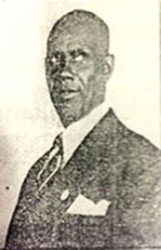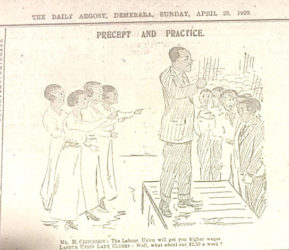By Nigel Westmaas
How the Poor Live
“…There has been a good deal said on all sides, but personally I sympathise with all the laboring sections in the colony and my organisation as well as myself feel not alone for the sections we approached the Chamber of Commerce on behalf but also for the much underpaid clerks, who as well toil faithfully and hard for their meagre stipends, and are exposed to the same cruel, vicious nefarious and highly immoral profiteering system existing.
These are hard and indeed troublous times and when one considers the excessive profits of all the commercial organisations in the colony one feels that the State sided and other churches coupled with our Government morally stand charged for aiding and bringing about without interference the crippling of the poor hard worked laboring classes who are being hauled down the awful precipice into the chasm of penury, and utter destitution. I welcome open public opinion and am prepared to prove the just equitable and moral claims of the laboring classes.”
Very truly Yours,
Hubert Critchlow
Secretary-Treasurer BG Labour Union, 20, Regent Street
Letter to Daily Argosy, May 22, 1920
There is a general and expected tendency on the part of historians, nationalist custodians and people in general to glorify independence leaders and trailblazers of the anticolonial movement. Many times these accolades are deserving but it is generally disappointing to hear the repetitiveness of uncritical clichés. We often hear the mantra “founding father” without ongoing assessment or verification. The same goes for “martyrs” and the focus of this article, Hubert Nathaniel Critchlow. To paraphrase CLR James, “what do they know of Critchlow who only Critchlow know?”
Critchlow’s name is quite fittingly placed in the pantheon of the greatest Guyanese for his work with the labour movement in Guyana and in the region. But is this the whole Critchlow? Do we miss out on the challenges he faced in his own career, his grit and determination in the time and context when his name was not yet hallowed in unchecked glory? Should we forget the halting, tough beginnings because we tend to lionize an individual at the apex of his career rather than observe that he is even potentially greater because of the circumstances that he had to fend off?

One of the effortlessly rehashed narratives of Critchlow was that he founded the British Guiana Labour Union (BGLU) almost like a one man show. The truth is he was part of a collective that founded the union in January 1919 and his first function was as Secretary-Treasurer and not President of the union. One name lost to history, William Hosannah, was in fact listed as the President of the BGLU in 1919. Hosannah, speaking as President addressed a rally in July 1919 at the Parade ground extolling the arrival of the union, its 4,000 plus members and the desire to “celebrate peace” the First World War having just ended in November 1918.
The BGLU represented a vast array of worker categories against the power of the Chamber of Commerce including second forewomen, winchmen, gangway men, stevedores, casual sugar packers, wharf labourers, wharf boys, drogers, forewomen, coal carriers, and water women, among others.
Even in 1919 the BGLU was not exclusively labour oriented. The union made political calls for adult suffrage, the nationalization of railways, fought for better treatment of returning Guianese World War I veterans and fought vigorously against the Seditious Publications Ordinance of 1919. The Seditious Bill was a colonial inspired legislation mainly designed and intended to halt the burgeoning activism of Marcus Garvey and his Universal Negro Improvement Association (UNIA) throughout the colonial world. In Guyana the first tentative steps to establish a UNIA counterpart in Guyana had begun in 1919 and several leading members of the BGLU held simultaneous membership in the UNIA.
Hubert Critchlow, a former stevedore was Secretary Treasurer of the BGLU when he wrote the letter (at the beginning of this article) that was published in the Daily Argosy (part of a longer missive) in 1920, some 96 years ago. At the time of Critchlow’s intervention the trade union movement was in its infancy. Between 1922 and 1961, from a statistic available in Ashton Chases’ History of Trade Unionism in Guyana, there were 120 registered trade unions in Guyana. Many of these unions enjoyed brief, transitory lives, some actually petering out in months if not years. Today, there are probably fewer than 25 organised trade unions in Guyana. We are told there is no need for a full-fledged Labour Ministry and there is palpable cynicism with the conditions of labour in modern Guyana and the cynicism that Critchlow and his comrades probably faced in 1920 and onwards – is still very much present. The Chamber of Commerce Critchlow and his comrades faced in 1920 was obviously a hostile outfit towards unionism. Has this changed in 2016?

In her well researched assessment of Hubert Critchlow, historian Hazel Woolford emphasized his abilities as an athlete, singer, footballer and cricketer and noted that in 1925, six years after he had helped form the union, Critchlow was invited to join professional cricket in England but had declined.
Critchlow once attempted to open a shop in Regent Street but the effort was undercut by big business. He faced intense criticism in the early years of the BGLU inclusive of his management style. One of his friends and appointee, HW Grant, was criticised for mishandling union funds.
During the negotiations for better working conditions and stirrings of a formal union Critchlow, like many politicians and labour leaders enjoyed some dialogue and cooperation with one of the allegedly more liberal governors, Sir Wilfred Collett. According to Woolford, “Governor Collett advised Critchlow to establish a genuine trade union and to seek the assistance of unions in England.”
Critchlow was perspicacious in linking international development to the local, British Guiana scene, more so than other leaders in Guyana at the time and his desires for the success of the labour movement extended beyond the colonial shores to include regional and international developments as he saw great potential in linking international solidarity with durable organic ties with influential labour and left wing organisations.
As early as in 1926 Critchlow supported the call for a West Indies Federation and again in 1944.
Critchlow for his part went to Soviet Union in 1932 to attend the first Congress of the International Labour Defence (ILD), an organisation with established links with the Soviet Union at the time together with trade unionist Vivien Henry of Trinidad and Tobago.
When Critchlow returned home in 1932 he addressed a public meeting in Georgetown and established a branch of the ILD. He also recounted his experiences of his visits to Holland and Germany
Critchlow was correspondingly a member of the International Trade Union Committee of Negro Workers (ITUCNW) which was established out of “an inability of the communist parties of the West to adequately deal with the Negro question.” and was even identified as “receiving instruction from the ITUCNW.”
Logically, given the political climate in the period, Critchlow was accused of “experiments in sedition, class warfare and interracial strife” and of “absorbing Russian ideas.”
In 1939 Critchlow and other members of the BGLU including its first female President Johanna Harris gave testimony to the Moyne Commission. Critchlow argued that although the work was regular the wages were low. He instanced the cases of the saw-mills, bakeries and the Public Works Department.
In 1941 Critchlow became Secretary of the British Guiana Trade Union Congress registered that same year.
In 1947 Critchlow made his first official political play (he had been a member of ARF Webber’s Popular Party in 1926 and had advocated for the extension of voting rights for women) when he was nominated President of the British Guiana Labour Party in elections of the same year. He contested and won the South Georgetown but lost his seat after a successful petition was brought by Frances Stafford, a white female contestant he had defeated. The petition eventually found that Critchlow had “defamed the character” of Ms Stafford.
The story is told by journalist Percy Armstrong that Critchlow, while forlornly standing on the sidelines watching the 1954 May Day parade was enticed to join in by Cheddi Jagan but he declined. Armstrong surmised that Jagan’s invitation came as a result of the fact that Critchlow’s son was in the parade.
In later years Critchlow’s star waned and he was often booed at workers’ rallies. Woolford states that the May Day parade of 1957 was the last rally Critchlow addressed. He died without much fanfare in 1958.
All of these episodes in Critchlow’s life do not detract but enhance the greatness of “Skibby”.
His impact on Guyana and the region and even further afield was dramatic and long lasting. Among his accomplishments included the introduction of the eight-hour day, the Rent Restriction Ordinance, universal adult suffrage; the fight against the Seditious Publications Bill and other infringements on democracy; Workmen’s Compensation Ordinance; Picket Ordinance; Old Age Pension scheme; free breakfast for schoolchildren and of course his input in the legislative development of unions and his organising abilities.
Today, how do the popular media and modern scholars respond to this disparity between the very wealthiest and the impoverished masses? Can the echoes of the past resistance to industrial capitalism as instanced in unionists like Critchlow be resurrected in the modern age when the enemy is sometimes invisible? In Guyana the situation is not a direct case of capitalism versus the worker described in Critchlow’s time – one has to place the existing imbroglio in context of a third world economy and all that goes with it: the rural-urban divide, the penetrative drug trade, corruption across political generations, rapacious and unregulated foreign capital, the uneasy mix between formal organic capitalism and the lumpen, money laundered capital, and of course, the importance of overseas remittances in affecting the lives of many citizens. And still we see the local employees, ravished of pride and dignity by low salaries and the insanity of working conditions in 2016 Guyana. Apart from a few strong and consistent voices there is no general attention to and respect for labour and the Guyanese working class (however we conceive the term ‘working class’ in this day and age) on the scale that Critchlow managed to impress on Guyana in the decades from the 1920s.
From the 1905 rebellion, and his active participation and leadership in that event, to the 1950s Hubert Critchlow stormed through Guyanese history like a blaze of light. His accomplishments remain all the more staggering in the range and sweep of activity, and the social courage of this trade unionist. In the month of May and especially as we reminiscence over this great Guyanese in the jubilee year of independence, Critchlow must be recalled as one of the greatest sons of the soil.





